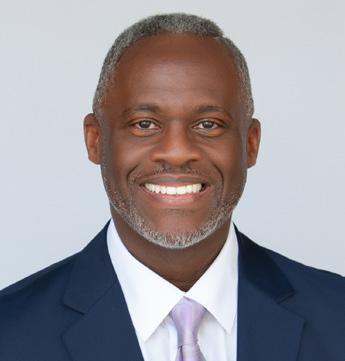
4 minute read
LEADING BEYOND INFLUENCE
“Let this mind be in you, which was also in Christ Jesus” (Philippians 2:5 KJV; see also vv. 3–8).
Many authors and speakers have correctly noted that leadership is influence—the ability to motivate people to action without force or demand. We know this is true, and we see this demonstrated in King David. In 2 Samuel 23:1–2, David identifies himself as the son of Jesse, the man who was raised up on high by God, the anointed of God, and the sweet psalmist of Israel. God had spoken to him and through him by the Spirit of the Lord, and the word of the Lord was in his tongue. He was a leader by all accounts and had great influence on others.
So great was David’s influence that his very suggestions or desires compelled men to act on his behalf. In 2 Samuel 23:13–17, David found himself amid a battle with the Philistines. While fenced in by these Philistines and hiding out in the cave of Adullam, he had a moment of yearning for the familiar—for the comforts of his homeland. In his longing, David said, “Would I ever like a drink of water from the well at the gate of Bethlehem!” (23:15 MSG). He simply mentioned his desire, and without a second thought, his top three warriors swung into action. They fought their way through the enemy line to access the well of Bethlehem, gathered water into a container, and brought it back to David to drink.
David was esteemed by these men. Maybe it was because of David’s victories in battle, his position as king, and his courage. But David understood that the glory for his victories belonged to God. The loyalty demonstrated by his mighty men, the willingness to give one’s life for another, was something that only God was worthy of. In this moment, not only did David display the power of influence but, far beyond influence, the courage to lead by example.
Leadership requires humility, discernment, sacrifice, and wisdom. We see these characteristics displayed in King David. When the three mighty men brought back the water, David, in his wisdom and discernment, did not drink it. Instead, he considered the lives of those who willingly sacrificed their safety for his comfort, and he honored their efforts by recognizing their sacrifice. David understood that all things were lawful for him, but all things were not expedient (1 Corinthians 10:23), so he offered a sacrifice instead. In humility he chose not to be so selfish as to partake of the water, though he had every right to as the king and leader. Instead, just as the three warriors sacrificed their safety, David sacrificed his comfort and desire by pouring out the water as an offering to the Lord.
Leadership is about being the example—about humbling ourselves before the Lord, being first a partaker, leading from the front, being what we preach and teach. On this day, David did this very thing. He did not look on his own desires; instead, “in lowliness of mind,” he esteemed the effort of the three warriors more important than his personal pleasure!
We see this behavior in Jesus: In lowliness of mind, he esteemed others better than himself. He did not look on his own things—his own interests—but was concerned for the interests of others. Paul goes on to describe him,
Who, being in the form of God, thought it not robbery to be equal with God: But made himself of no reputation, and took upon him the form of a servant, and was made in the likeness of men: And being found in fashion as a man, he humbled himself, and became obedient unto death, even the death of the cross. (Philippians 2:6–8 KJV)
Leadership is more than influence. Leadership is loving sacrifice, service, humility, and submission to a greater authority than one’s self.
Let this mind be in you, which was also in Christ Jesus—Philippians 2:3–8.










